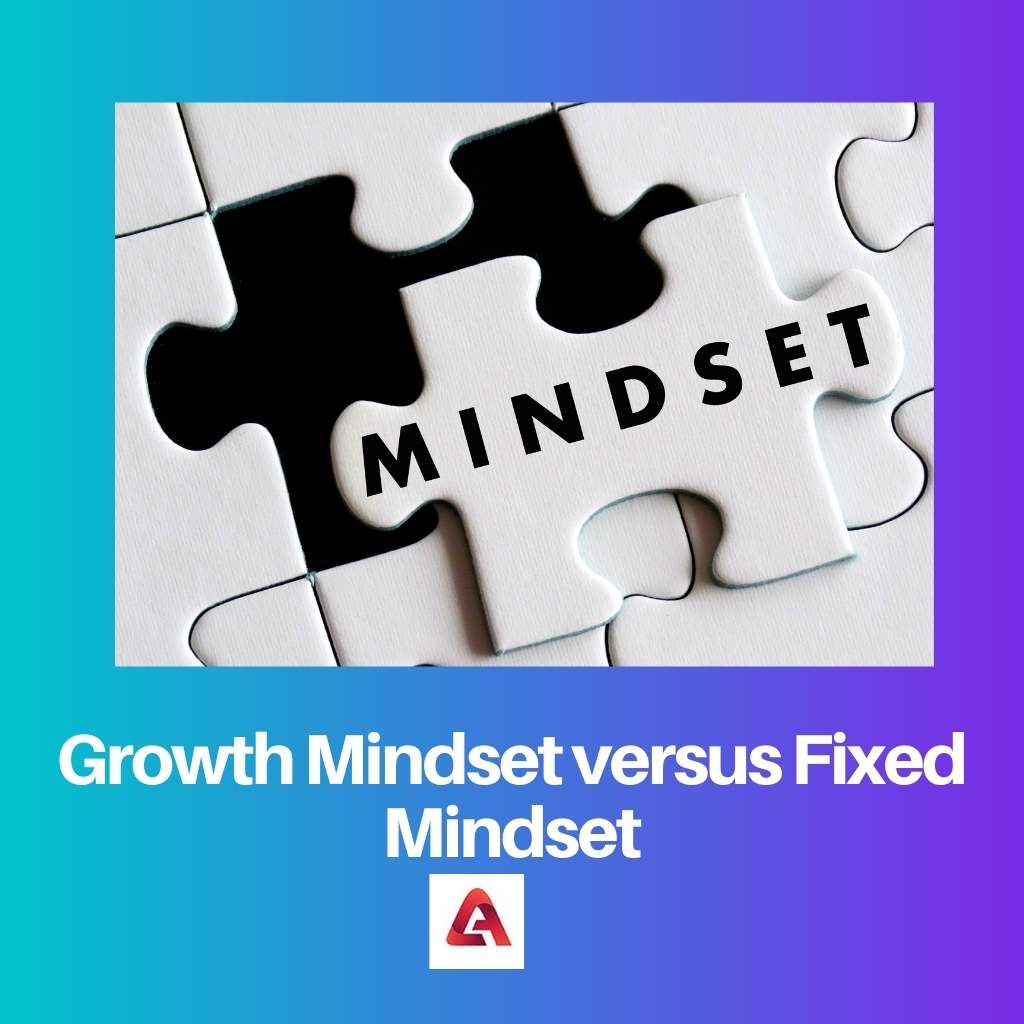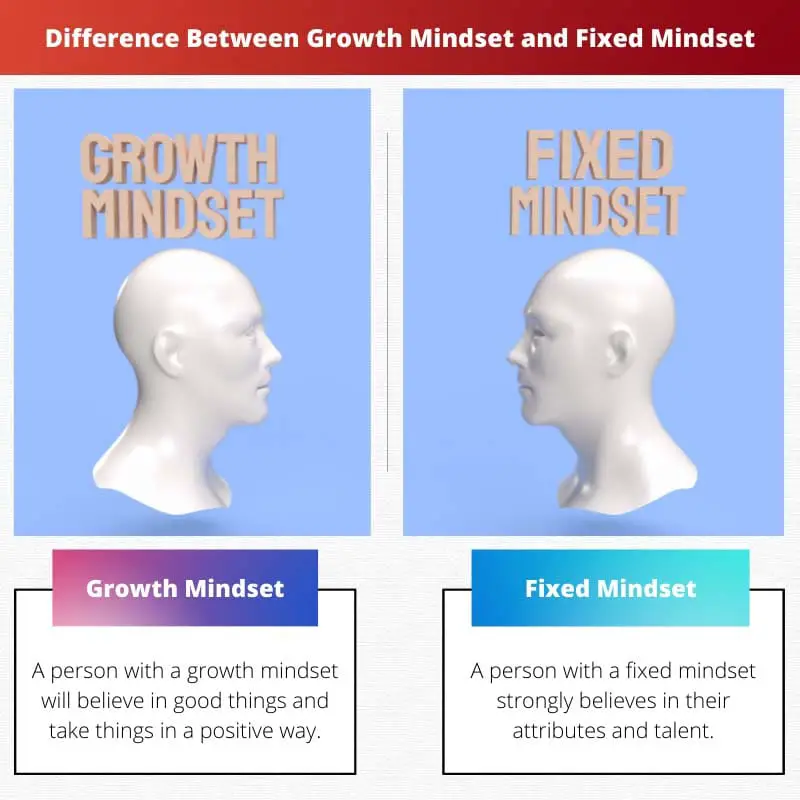The way we structure ourselves will decide our mindset. Our thinking about the past, present, and future will affect our daily activities and also our mindset.
Depending on our thinking, we can differentiate our mindset into a fixed mindset and growth mindset. The changes in our habits also affect our mindsets.
Key Takeaways
- A growth mindset believes that intelligence and abilities can be developed, while a fixed mindset assumes they are static and unchangeable.
- Individuals with a growth mindset embrace challenges, persist through obstacles, and view effort as a path to mastery.
- A fixed mindset may hinder personal growth, as it can lead to avoiding challenges, giving up easily, and seeing effort as fruitless.
Growth Mindset versus Fixed Mindset
A growth mindset is the belief that abilities and intelligence can be developed and improved through effort, practice, and learning from mistakes. A fixed mindset is the belief that abilities and intelligence are fixed traits that cannot be changed, leading to a tendency to avoid challenges and give up easily.

A person with a growth mindset will believe in good things and take things in a positive way. Intelligence and quality will develop in growth mindset people.
Growth mindset, people trust their talents and inputs to get better output instead of blindly believing the luck.
They can improve their work and actions to get better results. Learning is important to get things off as it is.
In the growth mindset, people know it very well and involve themselves in various processes of learning. They bounce back and motivate themselves with a strong effort.
A person with a fixed mindset strongly believes in their attributes and talent. In adulthood, they have thought of dominant characters and believe they have natural talents.
Fixed mind people do not take challenges and have fear about the future. They mostly avoid challenges. They gave up things easily and didn’t even try again.
They got jealous of other people’s success. They take the feedback in a negative manner and consider that a personal attack. They do not believe that intelligence will develop by learning.
Comparison Table
| Parameters of comparison | Growth Mindset | Fixed Mindset |
|---|---|---|
| Developed IQ | The intelligence will grow over the time | The intelligence fixed by the time |
| Motivation | Growth mindset people willingly involve in activities | Fixed mindset people avoid the challenges. |
| Effort | Growth mindset people put effort to achieve the destination | Fixed mindset people believe that effort isn’t important |
| Acceptance | Growth mindset people overcome the failures and accept the reality | Fixed mindset people worry about temporary failures |
| Inspiration | Growth mindset people take the success of others as inspiration | Fixed mindset people will become jealous of other success |
What is Growth Mindset?
A person with a growth mindset will believe in good things and take things in a positive way. Intelligence and quality will develop in growth mindset people.
Growth mindset, people trust their talents and inputs to get better output instead of blindly believing the luck.
They can improve their work and actions to get better results. Learning is important to get things off as it is.
In the growth mindset, people know it very well and involve themselves in various processes of learning. They bounce back and motivate themselves with a strong effort.
A growth mindset is important to learn, motivate, and be resilient. In the growth mindset, people do not worry about temporary failures and are conscious of their mistakes and correction.
They embrace themselves for lifelong learning.
They believe that learning will help to achieve their destinations. They put more effort into learning more and improving their skills.
They take feedback as a source to improve themselves from mistakes. They are vulnerable and hyperactive.
They turn every opportunity into a learning platform. They feel happy and inspired by others’ success.

What is a Fixed Mindset?
A person with a fixed mindset strongly believes in their attributes and talent. In adulthood, they have thought of dominant characters and believe they have natural talents.
Fixed mind people do not take challenges and have fear about the future. They mostly avoid challenges. They gave up things easily and didn’t even try again.
They got jealous of other people’s success. They take the feedback in a negative manner and consider that as a personal attack.
They do not believe that intelligence will develop by learning.
People with fixed minds will have negative thinking. For example, if a person with a fixed mind faces failures, then he gives up and worries about finishing the task provided to him.
They discourage themselves and do not put effort into achieving the task. Unlike growth mindset people, fixed mindset people are totally different.
They spend more time worrying about failures. They do not put themselves into challenges and fear the risks.
They didn’t believe themselves in self-doubting tasks and discouraged themselves.
The individual trait that does not make any changes in the thought of foxed min people.
They believe in natural talents, avoid difficult tasks, ignore people’s feedback, feel jealous of others’ success, hide their mistakes, Fear the future, are Self-doubting, worry about criticism, and give up things easily.
Main Differences Between Growth Mindset and Fixed Mindset
- In a growth mindset, people take the success of others as inspiration, whereas in a fixed mindset, people will become jealous of others’ successes.
- Growth mindset, people overcome failures and accept reality, and
Fixed mindset, people worry about temporary failures. - In a growth mindset, people put effort into achieving the destination, whereas in a fixed mindset, people believe that effort isn’t important.
- People willingly participate in activities in a growth mindset, but in a fixed mindset, people avoid challenges.
- Growth mindset, people take the feedback in a positive manner, but in a fixed mindset, people take the feedback as a personal attack.


The main differences between growth and fixed mindsets are eloquently explained here. It is clear that developing a growth mindset can lead to increased motivation, resilience, and a more positive approach to challenges.
The emphasis on effort and learning from mistakes in a growth mindset is inspiring. It highlights the importance of self-awareness and adopting a positive perspective towards achieving goals.
A growth mindset is crucial for continuous learning and self-improvement. This article provides a comprehensive comparison between growth and fixed mindsets, emphasizing the importance of embracing challenges and persisting through obstacles.
This article details the impact of mindset on personal development with key takeaways that serve as a guide for cultivating a growth mindset. It is evident that adjusting our thinking patterns can greatly influence our lifestyles.
A fixed mindset can lead to avoidance of challenges and resistance to embracing change. The comparison table provided here effectively differentiates the characteristics of both mindsets, offering a clear framework for understanding the importance of personal growth.
The way we structure ourselves dictates our mindset and emotional wellbeing. It is important to understand the differences between a growth mindset and a fixed mindset in order to reflect and work on personal development.
I fully agree with your insight into the characteristics of a fixed mindset. By recognizing the need for change and the benefits of a growth mindset, individuals can overcome self-doubt and fear to pursue personal and professional development.
The concept of growth mindset versus fixed mindset is deeply explored in this article. It is evident that developing a growth mindset can lead to a more optimistic and proactive approach to challenges, paving the way for greater personal achievement.
This article effectively highlights the impact of mindset on personal development and success. Emphasizing the importance of embracing challenges and persisting through obstacles, it provides valuable insights into the differences between growth and fixed mindsets.